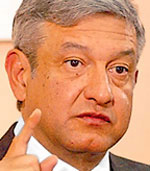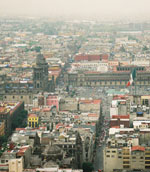
Andres Manuel López Obrador, 2004 Mayor of Mexico City and World Mayor finalist for the Americas

FRONT PAGE
About us

The 2010 results
The 2010 project
The 2010 finalists
Code of Ethics
The World Mayor Prize

The 2008 results
The 2008 project
The 2008 finalists
The World Mayor Award

The 2006 results
Methodology
The 2006 finalists
The World Mayor Award

The 2005 results
Contest methodology
List of finalists
The World Mayor Award

Mayor of Athens
Mayor of Guatemala City
Mayor of Mississauga
Mayor of San Fernando
Mayor of San Francisco

Mayor of Athens
Mayor of Guatemala City
Mayor of Mississauga
Mayor of San Fernando
Mayor of Vienna

Comments on finalists from The Americas
Comments on finalists from Europe
Comments on finalists from Asia, Australia and Africa
Comments on Addis Ababa
Comments on Antananariva
Comments on Athens
Comments on Atlanta
Comments on Belo Horizonte
Comments on Bonn
Comments on Guatemala City
Comments on Karachi
Comments on London
Comments on Melbourne
Comments on Mississauga
Comments on Rio de Janeiro
Comments on Rome
Comments on San Fernando
Comments on San Francisco
Comments on Toronto
Comments on Vancouver
Comments on Vienna

Mayor of Addis Ababa
Mayor of Antananarivo
Mayor of Athens
Mayor of Belo Horizonte
Mayor of Bonn
Mayor of Ekaterinburg
Mayor of Guatemala City
Mayor of Innsbruck
Mayor of Karachi
Mayor of Kiev
Mayor of Melbourne
Mayor of Mississauga
Mayor of Munich
Mayor of Rhodes
Mayor of Rome
Mayor of Tshwane
Mayor of Vienna

The 2004 contest
List of all 2004 finalists
Edi Rama wins 2004 award
People ask - Edi Rama replies
Why we voted for the Mayor of Tirana
Why we voted for the Mayor of Mexico City
History of Tirana

Front Page
Site Search
About City Mayors
Mayor of Mexico City
By Nick Swift
Like the sauce by the name of which most North Americans, at least, will know the part of Mexico that is his home (Tabasco), there is one thing no one could ever say about Andres Manual Lopez Obrador, Mayor of Mexico City: and that, of course, is that he is insipid.
Showing himself more committed to his citizens’ biological clocks than to the mechanical ones, he stood against the imposition of Daylight Savings Time, declaring that the ability to change the hour was beyond the power of President Vicente Fox; he instituted a free circus with exotic animals in front of the city’s main cathedral; when a suspected thief was killed by a raging mob just outside the city, he reflected that their action was the real Mexico expressing itself, and that village traditions should not be interfered with; when the city was plagued by bank robberies, he criticized the banks for having inadequate security. Most recently, he has found the honesty that has always been his watchword assailed, and isolation seems to have begun to be added to his portrait like a new colour.
University educated in political science, Mr. Obrador – or AMLO, as he is sometimes called – supported native Tabascans through the work of an institute he oversaw, and ?The good of all, but most of all, of the poor?, has been his credo ever since. It was he who, even before becoming the third elected Mayor of Mexico, transformed the lot of the Party of the Democratic Revolution (PRD), which was created in 1989 after the expulsion from the ranks of the Institutional Revolutionary Party (PRI), which had held power for seven decades and under which the office of mayor of the capital had always been an appointment, of Cuauhtémoc Cárdenas. (Cárdenas had attempted to further democratic trends, and the presidential election he lost in 1988 was rigged. He became the first elected Mayor of Mexico in 1997.) During the presidency of Carlos Salinas de Gortari, Mr. Obrador exercised what has been widely acknowledged as his stellar organizing abilities, and nurtured and consolidated strong support for the PRD in Tabasco, and garnered 40 per cent of the votes in the 1994 race for governor, even when (it has since been revealed) his opponent spent some 60 times the total allowed by law on his campaign.
He created the ‘Brigades of the Sun’, after the PRD party’s symbol of the Aztec sun, to knock on doors and offset the PRI’s teams, which offered gratuities in exchange for votes, with the thought that it is more important for the future to eliminate corruption. One result was that AMLO was elected PRD president by an overwhelming majority in 1996.
In the following months, Mr. Obrador used the same strategy to win states and, then, throughout the entire country. In the course of this campaign, he transferred focus of attention and expenditure to electronic media, a new development for Mexico, and implemented sophisticated polling, consulting and advertising techniques, with great success for the PRD, which, in September 1996, joined the Socialist International Movement as a full member.
The flight of elements of the crumbling PRI to the party of the risen sun stimulated Mr. Obrador to take measures to prevent them bringing old habits with them, placing stringent limits on salaries and privileges, and speaking against others, such as the keeping of mistresses.
After a campaign another theme of which was the need to act against the crime that the people of Mexico City made clear was their greatest concern, he was elected Mayor of Mexico City on 15 December 2000 for a term of six years. Since then he has become well known for, among other things, the way he starts each day: at five o’clock, with a press conference by 6.30. Among his first moves were social assistance allowances for the elderly, the handicapped, and single mothers with school age children, and another programme for youth in high-crime areas. He has, as of this date, seen the start of construction of Mexico’s first state university, and has built enough new high schools to serve nearly 9000 children. He brought Rudy Giuliani to put into practice the zero tolerance approach to crime that he used as Mayor of New York City, and switched city computers from Microsoft to free Linux operating systems, with the money saved to, again, be used to help the economically disadvantaged.
The increasing of Mexico City’s landscape has for many years been an unruly process, so that a complete reorganization is necessary, whereby new housing will be built where it is most needed, and not where vested interests would have like it. About this challenge too Mr. Obrador seems enthusiastic and, halfway through his term, told the Mexican national assembly that his programme to meet it was half completed.
Two of his most visible accomplishments have been the construction of the two-level Distribuidor Vial, an overpass connecting a number of highways in a cloverleaf; and the remarkable saga of the restoration of the lost parts of Chapultepec Park. Over the years the wealthy and powerful had the unfortunate tendency to move into properties surrounding the park, and then, quite simply, take some of it. Mr. Obrador sent in the bulldozers. ‘No special interest groups,’ he said, ‘have any claim on us. We lick no one’s boots. Deliver to the people – that’s all we have to do.’
He did finally, however, accept the practicality of Daylight Savings Time, and apologized to the already-yawning journalists who see him in the morning.
Apprehensions may be proving true that the moral energy of the PRD and the success that has flowed from it have depended to too great a degree on AMLO’s own mind and character, his integrity and logistical gifts, and the corruption he has made his enemy would appear to have infiltrated, and be undermining, the political structure on which he stands. Videotapes have been broadcast showing senior PRD figures accepting large amounts of money in briefcases and negotiating payoffs, and the city finance officer in Las Vegas gambling away millions in American dollars of Mexico City’s money. Mr. Obrador, whose own record is as impeccable as his stated principles, has reacted with fury, a disavowal of knowledge, and accusations of conspiracy. There is more at stake, he says, than his own reputation: there is the future of Mexico. If, as many have claimed (but he has denied), he would have been a candidate for the presidency in 2006, it is easy to see how that might be the case.

Mexico City with its cathedral to the left of the photo (Photo by Arrakeen)
Introducing
World Mayor 2006
The World Mayor project is now in its third year. As in 2004 and 2005, this year’s World Mayor will again be seeking out mayors who have the vision, passion and skills to make their cities amazing places to live in, work in and visit. The World Mayor project aims to show what outstanding mayors can achieve and raise their profiles. It honours those who have served their communities well and who have made contributions to the well-being of cities nationally and internationally. The most outstanding mayor of 2006 will be presented with the World Mayor award.
In 2004, Edi Rama, Mayor of Tirana, won the Award. The 2005 winner was Dora Bakoyannis, Mayor of Athens and now Greek Foreign Minister.
Between January and May each year, citizens from across the world are invited to nominate mayors for the World Mayor Award. They are also asked to provide reasons for their choice. After the close of the nomination stage, City Mayors, the organisers of the contest, prepare a shortlist of mayors who go forward to the second round of the World Mayor contest. In 2006, the list of finalists includes 50 mayors from North and South America, Europe, Asia, Australasia as well as Africa.
